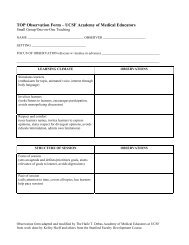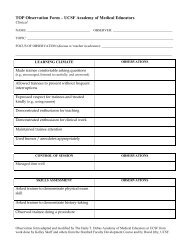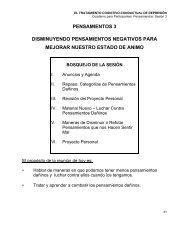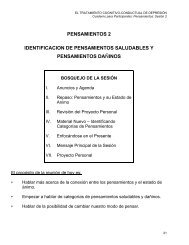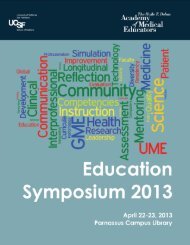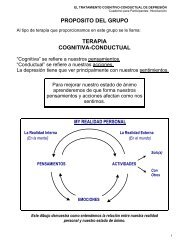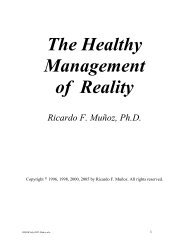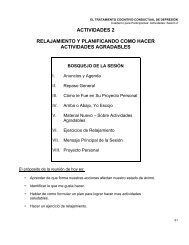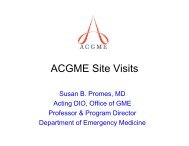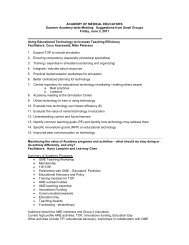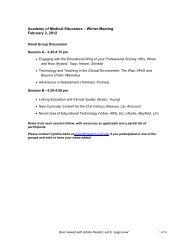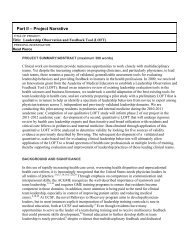2011 - UCSF School of Medicine - University of California, San ...
2011 - UCSF School of Medicine - University of California, San ...
2011 - UCSF School of Medicine - University of California, San ...
You also want an ePaper? Increase the reach of your titles
YUMPU automatically turns print PDFs into web optimized ePapers that Google loves.
<strong>UCSF</strong> Education Day <strong>2011</strong>pr<strong>of</strong>essional practice. Student focus groups (n=41)investigated student perceptions <strong>of</strong> medical educationand the learning environment at MUHAS.Results: MUHAS medical students and recentgraduates identified strengths <strong>of</strong> the curriculum inconferring medical knowledge. However, they identifiedsignificant gaps in their medical education with respectto practical clinical training. Surgical skills andambulatory outpatient care were highlighted as specificdeficiencies in clinical training. Both students and facultyfeel that clinical teaching is impeded by the large number<strong>of</strong> students in clinical sessions, limited facilities toconduct clinical teaching, and limited faculty to supervisestudents.Discussion: Increased practical clinical skill training isneeded to improve graduates’ clinical competency,especially in the areas <strong>of</strong> surgical skills and outpatientambulatory care. Informed by student, graduate, andstakeholder perspectives, MUHAS is currentlyundergoing major curriculum revisions focused oncompetency-based medical education and improvingclinical training.Reflective critique: In partnership with <strong>UCSF</strong>, MUHASis implementing efforts to increase clinical exposure,surgical skills simulation training, ambulatory careprecepting, and faculty development about clinicalteaching methodologies to improve medical educationand the preparation <strong>of</strong> graduates who are betterequipped to address health needs in Tanzania.Impact <strong>of</strong> Student-Run Clinics onPreclinical Students’ Socioculturaland Interpr<strong>of</strong>essional Attitudes: AProspective Cohort AnalysisLeslie C. Sheu, BA, <strong>UCSF</strong>, leslie.sheu@ucsf.edu; CindyLai, MD, <strong>UCSF</strong>, clai@medicine.ucsf.edu; Anabelle D.Coelho, MS, <strong>UCSF</strong>, anabelle.coelho@ucsf.edu; Lisa D.Lin, MS, <strong>UCSF</strong>, lisa.lin@ucsf.edu; Patricia Zheng, BS,<strong>UCSF</strong>, patricia.zheng@ucsf.edu; Patricia Hom, BA,<strong>UCSF</strong>, patricia.hom@ucsf.edu; Vanessa Diaz, BS,<strong>UCSF</strong>, Vanessa.diaz@ucsf.edu; Patricia S. O’Sullivan,<strong>UCSF</strong>, osullivanp@medsch.ucsf.eduBackground: Descriptive studies suggest that studentrunclinics (SRCs) positively impact participatingstudents. However, studies rarely include students frommultiple pr<strong>of</strong>essions, validated instruments, and a controlgroup. At our health pr<strong>of</strong>essions campus, first-yearstudents can participate in SRCs focusing on specificunderserved populations: Latino(a), Asian/PacificIslander, and urban homeless communities. In thisstudy, we used validated measures to explore the impact<strong>of</strong> these SRCs on preclinical students’ sociocultural andinterpr<strong>of</strong>essional attitudes.Methods: Using a pre-post control group design, weconducted a prospective cohort study <strong>of</strong> first-yearmedical, nursing, and pharmacy students whoparticipated in SRCs and those who did not. At thebeginning and end <strong>of</strong> the year, they completed surveysconsisting <strong>of</strong> demographics, validated measures onsociocultural awareness (SAMI) and readiness forinterpr<strong>of</strong>essional learning (RIPLS), and open-endedquestions.Results: Of all participating students, 77% (274 <strong>of</strong> 358)completed the post-survey, with 68% (n=182) havingmatching pre-post surveys. Students held positiveattitudes in sociocultural and interpr<strong>of</strong>essional domains.After adjusting for baseline scores, attitudes did not differsignificantly between those who participated in SRCsand those who did not. In the qualitative analysis, 99%reported reinforced or increased commitment to workingwith the underserved. Forty percent reported that theirexperiences made a positive impact on theirinterpr<strong>of</strong>essional attitudes.Discussion: In this study, we found no quantifiableeffect <strong>of</strong> SRC participation on sociocultural orinterpr<strong>of</strong>essional attitudes. However, students perceivedbenefits in both domains, suggesting that the SAMI andRIPLS may not be sensitive enough for measuring theeffects <strong>of</strong> SRCs. Further studies are needed to assessthe long-term impact <strong>of</strong> preclinical SRCs.Reflective critique: We have incorporated extensivefeedback from advisors and ESCape, and havesubmitted the abstract to an education meeting.Areas abstract covers: UMEDomain(s) addressed: Cultural Competence, Diversity,Evaluation <strong>of</strong> Programs and Curricula, Interpr<strong>of</strong>essionalEducationPurpose: To evaluate the impact <strong>of</strong> student-run clinics(SRCs) on sociocultural and interpr<strong>of</strong>essional attitudesacross health pr<strong>of</strong>essions.<strong>University</strong> <strong>of</strong> <strong>California</strong>, <strong>San</strong> Francisco • <strong>School</strong> <strong>of</strong> <strong>Medicine</strong> 33



